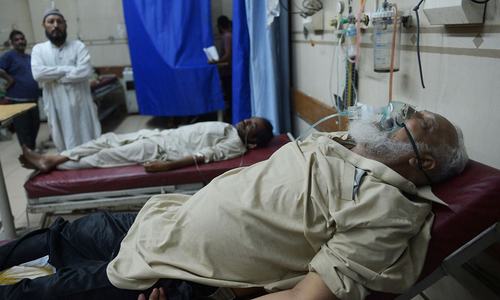KARACHI: The long-drawn controversy over three major hospitals seemed to have taken a decisive turn on Wednesday when Prime Minister Shehbaz Sharif in a meeting with Sindh Chief Minister Syed Murad Ali Shah agreed with the provincial government’s stance over their ownership and announced to hand them over to it under an agreement.
Expressing willingness to look into the concerns over the Medical and Dental Colleges Admission Test (MDCAT) held previous year by the Pakistan Medical Commission (PMC), the PM said the federal government would consider the matter if the provinces were ready to hold the entry test at their level.
The PM held a detailed meeting with CM in the presence of representatives of the allied Muttahida Qaumi Movement-Pakistan to discuss development projects of Sindh, including Karachi, and other issues pertaining to the federal government.
Source said CM Shah during the meeting built a strong case for the provincial government to independently run the Jinnah Postgraduate Medical Centre (JPMC), National Institute of Cardiovascular Diseases (NICVD) and National Institute of Child Health (NICH), highlighting the steps taken to improve operation of the three facilities.
Those hospitals, Mr Shah pointed out, were handed over to the provincial government by the federal government in 2011 after the 18th Amendment and till to date, the Sindh government had spent a total of Rs30,599.9m on them.
Also read: Centre notifies takeover of three Karachi hospitals citing Jan 1 SC judgement
The meeting was informed that the annual expenditure of the NICVD, now operating eight satellite units across the province, had been increased from Rs300 million in 2011 to Rs6 billion in 2022 whereas cancer treatment was being provided free of cost at the JPMC.
The sources said the CM urged PM Shehbaz to find out a way for the Sindh government to run those hospitals, telling him that the idea of a board as conceived by the Pakistan Tehreek-i-Insaf (PTI) government in 2019 was not workable.
Shehbaz urged to review PMC Act
On the issue of the PMC and MDCAT, Mr Shah highlighted the anomalies in the new system introduced for regulating medical and dental education by the PTI government without any consultation.
The provincial governments, he argued, had the prerogative to hold medical and dental college admission tests since Pakistan’s inception, but that was taken away by the PMC, a federal body.
Each province, he reasoned, had its own educational syllabus and it was not fair to have the test at the national level.
“The provinces were neither consulted over the establishment of the PMC nor MDCAT. The PMC Act deprives students with local domiciles of getting admission to medical and dental colleges in their own provinces,” he said.
Mr Shah also requested the PM to direct the PMC to accept the provincial cabinet’s decision of lowering the pass percentage of the MDCAT from 65 to 50 per cent.
The sources said there was no immediate assurance from Premier Shehbaz on that request and he only spoke about the need for making a proposal on holding the test at the provincial level.
The establishment of the PMC and the “flawed mechanism adopted” for carrying out medical and dental tests last year had attracted criticism from professional bodies as well as students.
A major development in this case was Sindh High Court’s (SHC) order which previous month declared void the provincial government’s decision to reduce passing marks from 65 per cent to 50pc in the test conducted last year.
The decision has affected over 800 students who have got admission on the basis of less than 65pc marks that they obtained in the MDCAT.
The JPMC, along with the NICH and NICVD, have been facing administrative uncertainty since 2011, when their employees had sought the SHC’s intervention against the likely devolution of these institutions to the province under the 18th Constitutional Amendment.
The matter remained pending till 2016, when the court ordered that the control of those hospitals would remain with the federal government. This judgment, however, was suspended by the Supreme Court (SC) the same year on an appeal filed by the Sindh government.
In January 2019, the SC rejected the Sindh government’s appeal and ordered the federal government to take control of the JPMC, the NICH in Karachi as well as the NICVD. The Sindh government filed a review petition which is still pending.
Published in Dawn, April 14th, 2022













































